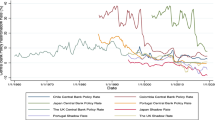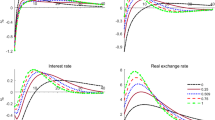Abstract
This paper fills the momentous gap by explicitly investigating the interplay of financial inclusion, financial stability, and shadow banking in 11 emerging market economies (EMEs) from 2010 to 2021. Employing panel quantile regression approaches, including simultaneous bootstrapped quantile regression and generalized quantile regression, the results indicate that while financial inclusion has a negative impact on financial stability, its impact is less pronounced in countries with high stability. Moreover, shadow banking, whether broadly or narrowly defined, tends to weaken the negative effects of financial inclusion, particularly in EMEs with medium and high levels of financial stability. Finally, Dumitrescu–Hurlin's panel causality test confirms bidirectional causality between financial stability and financial inclusion, financial stability and shadow banking, as well as financial inclusion and shadow banking. These findings highlight the need for policymakers in EMEs to prudently adjust shadow banking regulations to maximize their positive impact on financial inclusion and stability while concurrently minimizing potential risks.



Similar content being viewed by others
Data availability
Data used in this study is available from the author(s) upon request.
Notes
Author calculations based on FSB (2022) database.
FSB provides annual shadow banking data only for the following EMEs: Argentina, Brazil, Chile, China, India, Indonesia, Mexico, Russia, Saudi Arabia, South Africa, and Turkey.
The availability of data conditions the size of the panel.
Depositors with commercial banks (per 1,000 adults) and borrowers from commercial banks (per 1,000 adults) in WDI has been excluded from PCA due to large number of missing observations.
Before running the PCA for FI index, Bartlett's test of sphericity and the Kaiser–Meyer–Olkin (KMO) measure of sampling adequacy are performed (see Table 3). The significance of Bartlett's test of sphericity (p < 0.05) and the value of KMO index (> 0.5) indicate that the factor analysis is suitable (Hair et al. 2006; Tabachnick et al. 2007).
Stata (version 15) commands “sqreg”, and “genqreg” are used for the estimation of SQR, and GQR respectively.
The Stata code “genqreg” does not permit the statistical determination of the instruments’ robustness while implementing the GQR methodology. Nevertheless, this paper follows Reed (2015), Bellemare et al. (2017) and Isayev et al. (2023) who show that lagged variables serve as good instruments to deal with endogeneity problems.
It is worth reminding that, in models that involve multiplicative interactions, researchers should avoid interpreting the individual components of the interaction terms as unconditional or average effects (Brambor et al. 2006). The only inference the traditional results table provides is whether FI significantly affects FS for the unique case where shadow banking assets equal zero. Nonetheless, this is not the case in real-world situations. Hence, in Table 5, and 6 the coefficients of FI, SBB, and SBN cannot be interpreted as unconditional or average effects. That’s why before investigating interactions, first baseline model is established as shown in Table 4, to see the separate impact of FI on FS.
Results are available upon request.
Results are available upon request.
References
Acharya VV, Khandwala H, Öncü TS (2013) The growth of a shadow banking system in emerging markets: evidence from India. J Int Money Financ 39:207–230. https://doi.org/10.1016/j.jimonfin.2013.06.024
Adrian T, Jones B (2018) Shadow banking and market-based finance. International Monetary Fund. Retrieved from: https://ideas.repec.org/a/bfr/fisrev/2018222.html
Adrian T, Ashcraft AB (2016) Shadow banking: a review of the literature. Bank Crises Perspect New Palgrave Dict. https://doi.org/10.1057/9781137553799_29
Ahamed MM, Mallick SK (2019) Is financial inclusion good for bank stability? International evidence. J Econ Behav Organ 157:403–427. https://doi.org/10.1016/j.jebo.2017.07.027
Ali M, Hashmi SH, Nazir MR, Bilal A, Nazir MI (2021) Does financial inclusion enhance economic growth? Empirical evidence from the IsDB member countries. Int J Financ Econ 26(4):5235–5258. https://doi.org/10.1002/ijfe.2063
Apostoaie CM, Bilan I (2020) Macro determinants of shadow banking in Central and Eastern European countries. Econ Res-Ekonomska Istraživanja 33(1):1146–1171. https://doi.org/10.1080/1331677X.2019.1633943
Arora D, Kashiramka S (2023) What drives the growth of shadow banks? Evidence from emerging markets. Emerg Mark Rev 54:100993. https://doi.org/10.1016/j.ememar.2022.100993
Bellemare MF, Masaki T, Pepinsky TB (2017) Lagged explanatory variables and the estimation of causal effect. J Polit 79(3):949–963. https://doi.org/10.1086/690946
Brambor T, Clark W, Golder M (2006) Understanding interaction models: improving empirical analyses. Political Anal 14(1):63–82
Chernozhukov V, Hansen C (2005) An IV model of quantile treatment effects. Econometrica 73(1):245–261. https://doi.org/10.1111/j.1468-0262.2005.00570.x
Culp CL, Neves AM (2017) Shadow banking, risk transfer, and financial stability. J Appl Corp Financ 29(4):45–64. https://doi.org/10.1111/jacf.12261
Danisman GO, Tarazi A (2020) Financial inclusion and bank stability: evidence from Europe. Eur J Financ 26(18):1842–1855. https://doi.org/10.1080/1351847X.2020.1782958
Driscoll JC, Kraay AC (1998) Consistent covariance matrix estimation with spatially dependent panel data. Rev Econ Stat 80(4):549–560. https://doi.org/10.1162/003465398557825
Dumitrescu EI, Hurlin C (2012) Testing for Granger non-causality in heterogeneous panels. Econ Model 29(4):1450–1460
Elliott D, Kroeber A, Qiao Y (2015) Shadow banking in China: a primer. Econ Stud Brook 3:1–7
Feghali K, Mora N, Nassif P (2021) Financial inclusion, bank market structure, and financial stability: international evidence. Q Rev Econ Finance 80:236–257. https://doi.org/10.1016/j.qref.2021.01.007
Fratzscher M, König PJ, Lambert C (2016) Credit provision and banking stability after the Great Financial Crisis: the role of bank regulation and the quality of governance. J Int Money Financ 66:113–135. https://doi.org/10.1016/j.jimonfin.2016.02.015
FSB (2020) Global monitoring report on non-bank financial intermediation 2019. Financial Stability Board. Retrieved from: https://www.fsb.org/2020/01/global-monitoring-report-on-non-bank-financial-intermediation-2019/
FSB (2022) Global monitoring report on non-bank financial intermediation 2022. Financial Stability Board. Retrieved from: https://www.fsb.org/2022/12/global-monitoring-report-on-non-bank-financial-intermediation-2022/
Fung DW, Lee WY, Yeh JJ, Yuen FL (2020) Friend or foe: the divergent effects of FinTech on financial stability. Emerg Mark Rev 45:100727. https://doi.org/10.1016/j.ememar.2020.100727
Gebauer S, Mazelis F (2023) Macroprudential regulation and leakage to the shadow banking sector. Eur Econ Rev 154:104404. https://doi.org/10.1016/j.euroecorev.2023.104404
Ha D, Nguyen Y (2023) Institutional quality’s influence on financial inclusion’ impact on bank stability. Cogent Econ Financ 11(1):2190212. https://doi.org/10.1080/23322039.2023.2190212
Hair JF, Black WC, Babin BJ, Anderson RE, Tatham RL (2006) Multivariate data analysis. Uppersaddle River. Pearson Prentice Hall, Hoboken
Hannig A, Jansen S (2010) Financial inclusion and financial stability: Current policy issues. ADBI Working Paper No. 259. https://doi.org/10.2139/ssrn.1729122
Hodula M, Melecky A, Machacek M (2020) Off the radar: Factors behind the growth of shadow banking in Europe. Econ Syst 44(3):100808. https://doi.org/10.1016/j.ecosys.2020.100808
Igan MD, Pinheiro M (2011) Credit growth and bank soundness: fast and furious? IMF working papers 2011/278. https://doi.org/10.5089/9781463925956.001
International Monetary Fund (2014) Chapter 2. Shadow Banking around the Globe: How Large, and How Risky? In Global Financial Stability Report, October 2014: Risk Taking, Liquidity, and Shadow Banking: Curbing Excess while Promoting Growth. https://doi.org/10.5089/9781498390811.082
Isayev M, Bektas E (2023) The nexus between commercial bank lending and shadow banking assets: do bank risks and profitability moderate? Evidence from emerging markets. Appl Econ Lett 30(9):1162–1167. https://doi.org/10.1080/13504851.2022.2039364
Isayev M, Irani F, Attarzadeh A (2023) Asymmetric effects of monetary policy on non-bank financial intermediation (NBFI) assets: a panel quantile regression approach. J Econ Stud. https://doi.org/10.1108/JES-01-2023-0024
Istiak K, Serletis A (2020) Risk, uncertainty, and leverage. Econ Model 91:257–273. https://doi.org/10.1016/j.econmod.2020.06.010
Jiang H, Zhang J, Sun C (2020) How does capital buffer affect bank risk-taking? New evidence from China using quantile regression. China Econ Rev 60:101300. https://doi.org/10.1016/j.chieco.2019.04.008
Johnston J, DiNardo J (1963) Econometric methods
Kim DW, Yu JS, Hassan MK (2018) Financial inclusion and economic growth in OIC countries. Res Int Bus Finan 43:1–14
Koenker R, Bassett G Jr (1978) Regression quantiles. Econ J Econ Soc. https://doi.org/10.2307/1913643
Koenker R, Bassett G Jr (1982) Robust tests for heteroscedasticity based on regression quantiles. Econ J Econ Soc. https://doi.org/10.2307/1912528
Lambert C, Noth F, Schüwer U (2017) How do insured deposits affect bank risk? Evidence from the 2008 emergency economic stabilization act. J Financ Intermed 29:81–102. https://doi.org/10.1016/j.jfi.2015.07.001
Lin B, Xu B (2018) Factors affecting CO2 emissions in China’s agriculture sector: a quantile regression. Renew Sustain Energy Rev 94:15–27. https://doi.org/10.1016/j.rser.2018.05.065
López T, Winkler A (2019) Does financial inclusion mitigate credit boom-bust cycles? J Financ Stab 43:116–129. https://doi.org/10.1016/j.jfs.2019.06.001
Mello M, Perrelli R (2003) Growth equations: a quantile regression exploration. Q Rev Econ Finance 43(4):643–667. https://doi.org/10.1016/S1062-9769(03)00043-7
Morgan P, Pontines V (2014) Financial stability and financial inclusion. ADBI Working Paper 488. https://doi.org/10.2139/ssrn.2464018
Neaime S, Gaysset I (2018) Financial inclusion and stability in MENA: evidence from poverty and inequality. Financ Res Lett 24:230–237. https://doi.org/10.1016/j.frl.2017.09.007
Nguyen TD, Du QLT (2022) The effect of financial inclusion on bank stability: evidence from ASEAN. Cogent Econ Financ 10(1):2040126. https://doi.org/10.1080/23322039.2022.2040126
Opoku EEO, Aluko OA (2021) Heterogeneous effects of industrialization on the environment: evidence from panel quantile regression. Struct Chang Econ Dyn 59:174–184. https://doi.org/10.1016/j.strueco.2021.08.015
Ozili PK (2021) Has financial inclusion made the financial sector riskier? J Financ Regul Compliance 29(3):237–255. https://doi.org/10.1108/JFRC-08-2020-0074
Powell D (2020) Quantile treatment effects in the presence of covariates. Rev Econ Stat 102(5):994–1005. https://doi.org/10.1162/rest_a_00858
Powell D (2022) Quantile regression with nonadditive fixed effects. Empir Econ 63(5):2675–2691. https://doi.org/10.1007/s00181-022-02216-6
Pozsar Z (2013) Institutional cash pools and the Triffin dilemma of the US banking system. Financ Mark Inst Instrum 22(5):283–318. https://doi.org/10.1111/fmii.12013
Reed WR (2015) On the practice of lagging variables to avoid simultaneity. Oxford Bull Econ Stat 77(6):897–905. https://doi.org/10.1111/obes.12088
Saha M, Dutta KD (2021) Nexus of financial inclusion, competition, concentration, and financial stability: cross-country empirical evidence. Compet Rev Int Bus J 31(4):669–692. https://doi.org/10.1108/CR-12-2019-0136
Saha M, Dutta KD (2022) Does governance quality matter in the nexus of inclusive finance and stability? China Finance Rev Int 13(1):121–139. https://doi.org/10.1108/CFRI-08-2021-0166
Sahay MR, Cihak M, N’Diaye MP, Barajas MA, Mitra MS, Kyobe MA, Yousefi MR (2015) Financial inclusion: can it meet multiple macroeconomic goals? Int Monetary Fund. https://doi.org/10.5089/9781513585154006
Stein JC (2010) Securitization, shadow banking & financial fragility. Daedalus 139(4):41–51
Tabachnick BG, Fidell LS, Ullman JB (2007). Using multivariate statistics (Vol. 5): Pearson Boston
Uddin A, Chowdhury MAF, Sajib SD, Masih M (2020) Revisiting the impact of institutional quality on post-GFC bank risk-taking: Evidence from emerging countries. Emerg Mark Rev 42:100659. https://doi.org/10.1016/j.ememar.2019.100659
Uhde A, Heimeshoff U (2009) Consolidation in banking and financial stability in Europe: empirical evidence. J Bank Finance 33(7):1299–1311. https://doi.org/10.1016/j.jbankfin.2009.01.006
Vo AT, Van LTH, Vo DH, McAleer M (2019) Financial inclusion and macroeconomic stability in emerging and frontier markets. Ann Financ Econ 14(02):1950008. https://doi.org/10.1142/S2010495219500088
Wang W, Ning Z, Shu Y, Riti MKJ, Riti JS (2023) ICT interaction with trade, FDI, and financial inclusion on inclusive growth in top African nations ranked by ICT development. Telecommun Policy 47(4):102490. https://doi.org/10.1016/j.telpol.2023.102490
Wooldridge JM (2015) Introductory econometrics: A modern approach. Cengage learning
Yu S, Hu X, Li L, Chen H (2020) Does the development of renewable energy promote carbon reduction? Evidence from Chinese provinces. J Environ Manage 268:110634. https://doi.org/10.1016/j.jenvman.2020.110634
Author information
Authors and Affiliations
Corresponding author
Ethics declarations
conflict of interest
No potential conflict of interest is reported by the author(s).
Additional information
Publisher's Note
Springer Nature remains neutral with regard to jurisdictional claims in published maps and institutional affiliations.
Rights and permissions
Springer Nature or its licensor (e.g. a society or other partner) holds exclusive rights to this article under a publishing agreement with the author(s) or other rightsholder(s); author self-archiving of the accepted manuscript version of this article is solely governed by the terms of such publishing agreement and applicable law.
About this article
Cite this article
Isayev, M. Unraveling the interplay of financial inclusion, stability, and shadow banking in emerging markets. Econ Change Restruct 57, 62 (2024). https://doi.org/10.1007/s10644-024-09657-2
Received:
Accepted:
Published:
DOI: https://doi.org/10.1007/s10644-024-09657-2




